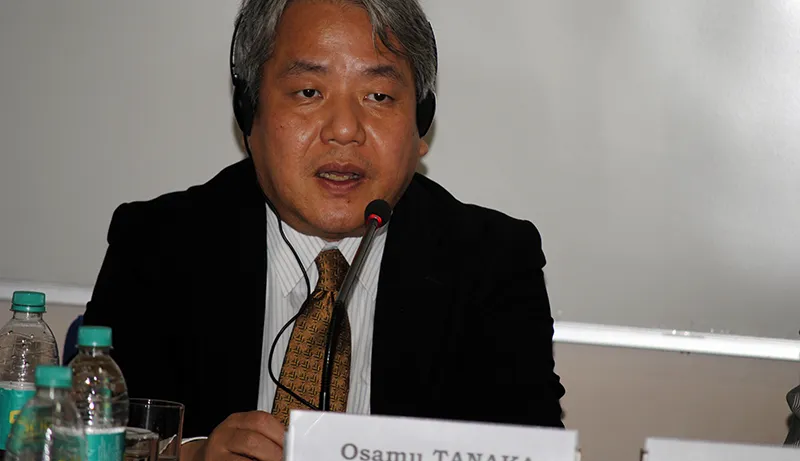Can China slow down without imploding? No, says Mr. Osamu Tanaka, the Executive Vice President of the Policy Research Institute of the Ministry of Finance, Japan. He predicts that 2017/8 will be the beginning of a Chinese financial meltdown.

The Executive Vice President of the Policy Research Institute of the Ministry of Finance (MOF), Japan, Mr. Osamu Tanaka, discussed some of the fiscal, economic, governmental, and development weaknesses facing the current Chinese government, and the new proposals Premier Li has proposed, at a lecture at Observer Research Foundation.
At the beginning of the lecture, titled ’Geo-economics in East Asia: Policy Challenges facing Xi Jinping’ on 17 September. Mr. Tanaka first addressed the economy and demographics. While issues pertaining to the reporting of the economy by the People’s Bank of China (hereby the Central Bank) were noted, Tanaka said his concern was largely with the outcome of changing demographics in China. The country is facing a mushroom of its population. This, according to Mr. Tanaka, is causing a rise in housing prices and a slow-down in the growth of public finances as more elderly people are leaving work and requiring social security. Although investments are high, a lack of private sector consumption in the Chinese economy is worrisome. Additionally, the purchasing power gap between the rich and the other classes is a significant structural issue that needs to be corrected. This trend is further exacerbated in the rural-to-urban demographics where rural areas are three times less well-off than their urban counter-parts.
Second, Mr Tanaka asserted that when China converted to a socialistic market economy in 1992, the role and function of the government were not fully defined. Twenty years later, structural weaknesses in the market and society are the outcomes. Governmental intervention in the economy, investment decisions by state-owned enterprises, and lending decisions by financial institutions are all highly politicised and improperly managed. Environmental issues are still largely unaddressed and unregulated. Social problems like inequality of medical and education institutions, and other issues relating to poverty are being largely ignored. Some state governments have assumed a proactive role and evicted people from their property to sell the lands to developers. The impropriety of these actions is largely due to the lack of distinction government’s capacities. Additionally, the dispensation of information to any inquiring bodies is not even or fair. Entities associated with the government have a monopoly on information in both the market and social spheres. There is also a lack of business ethics which is worrying. The central government is not facilitating or fostering the adoption of an ethos of ethics, and the outcome is a renowned lack of principles within the Chinese business community.
Third, Mr Tanaka touched upon the relationship between development and growth. According to him, development has been unbalanced, uncoordinated, and unsustainable. The allocation and management of energy, investments from private and state institutions, and resource division between the rural, commercial, and urban areas in China is not proportional or well-managed. The lack of even allocation and development was due to the desire for high growth which saw the dispensation of energy to commercial areas. Similarly, as Chinese companies were concerned with productivity, they have compromised on Research and Development funding. To keep up growth, Mr. Tanaka said local governments create dummy corporations to hide their debt; private citizens, unable to use that tactic, face a credit worthiness problem after the ’09 financial crisis. Recently, China has enacted legislation to correct these weaknesses in accordance with a new ’steady and sustainable’ growth policy. Mr. Tanaka was not optimistic about its success.
Mr. Tanaka then discussed "Liconomics". The new Premier Li Keqiang was elected in March 2013 and has since publically announced some policy proposals. The prongs of Premier Li’s economic plan are the promotion and development of ’urbanization’, a stream-lining of government functions, maintenance of a stable economy, and the successful adoption and implementation of a series of governmental reforms that were set in March 2013. The domestic and political support of Premier Li’s plans are not well-known as they have not been discussed in a public forum. Tanaka stated the status of politics of the Communist Party in China overall is largely unknown. An August meeting of the heads of the party offered few clues about their thoughts on Li’s proposals; the annual Party meeting in November is highly anticipated as the party will announce its opinions of the status of China.
Mr. Tanaka concluded by discussing the similarities and differences of Chinese and Japanese economic histories. Drawing from Japan’s economic history in the 1980’s, Mr. Tanaka warned against assuming a return of the high growth period, now growth has slowed. He stressed that the policies Japan passed after its economic ’bubble burst’ were successful because the public supported the measures; he does not see a similar popular support of the government in China.
Can China slow down without imploding? Mr. Tanaka thinks not and prophetically says 2017/8 will be the beginning of a Chinese financial meltdown.
(This report is prepared by Elizabeth Ray, Research Intern, Observer Research Foundation, Delhi)
The views expressed above belong to the author(s). ORF research and analyses now available on Telegram! Click here to access our curated content — blogs, longforms and interviews.




 PREV
PREV

